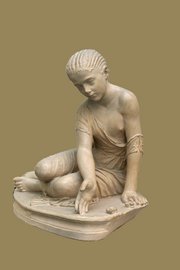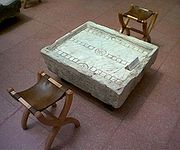
Roman Ludus
Encyclopedia


Culture of ancient Rome
Ancient Roman culture existed throughout the almost 1200-year history of the civilization of Ancient Rome. The term refers to the culture of the Roman Republic, later the Roman Empire, which, at its peak, covered an area from Lowland Scotland and Morocco to the Euphrates.Life in ancient Rome...
, the Latin
Latin
Latin is an Italic language originally spoken in Latium and Ancient Rome. It, along with most European languages, is a descendant of the ancient Proto-Indo-European language. Although it is considered a dead language, a number of scholars and members of the Christian clergy speak it fluently, and...
word ludus (plural ludi) has several meanings within the semantic field
Semantic field
A semantic field is a technical term in the discipline of linguistics to describe a set of words grouped by meaning in a certain way. The term is also used in other academic disciplines, such as anthropology and computational semiotics.-Definition and usage:...
of "play, game, sport, training" (see also ludic
Ludic
Ludic derives from Latin ludus, "play," and is an adjective meaning "playful." The term is used in philosophy to describe play as an act of self-definition; in literary studies, the term may apply to works written in the spirit of festival.-Homo ludens:...
).
An elementary
Elementary school
An elementary school or primary school is an institution where children receive the first stage of compulsory education known as elementary or primary education. Elementary school is the preferred term in some countries, particularly those in North America, where the terms grade school and grammar...
or primary school attended by boys and girls up to the age of 11 was a ludus. Ludi were to be found throughout the city, and were run by a ludi magister
Ludi magister
A Ludi Magister was a teacher at a Roman school, Roman Ludus. Magistri were often Greek or other educated slaves....
(schoolmaster
Schoolmaster
A schoolmaster, or simply master, once referred to a male school teacher. This usage survives in British public schools, but is generally obsolete elsewhere.The teacher in charge of a school is the headmaster...
) who was often an educated slave
Slavery in ancient Rome
The institution of slavery in ancient Rome played an important role in society and the Roman economy. Besides manual labor on farms and in mines, slaves performed many domestic services and a variety of other tasks, such as accounting...
or freedman
Freedman
A freedman is a former slave who has been released from slavery, usually by legal means. Historically, slaves became freedmen either by manumission or emancipation ....
. School started around six o'clock each morning and finished just after midday. Students were taught maths, reading, writing, poetry, geometry and sometimes rhetoric.
The word ludus also referred to a training school for gladiators; see Gladiator: Schools and training. The largest example of a gladiatorial ludus is the Ludus Magnus
Ludus Magnus
The Ludus Magnus or The Great Gladiatorial Training School is the largest of the gladiatorial arenas in Rome, Italy. It was built by the emperor Domitian in the valley between the Esquiline and the Caelian hills, an area already occupied by Republican and Augustan structures...
. The Ludus Dacicus
Ludus Dacicus
The Ludus Dacicus or The Dacian Gladiatorial Training School was one of the five gladiatorial arenas in Rome, located east of the Colosseum, where probably Dacian gladiators were trained...
was a school founded by Domitian
Domitian
Domitian was Roman Emperor from 81 to 96. Domitian was the third and last emperor of the Flavian dynasty.Domitian's youth and early career were largely spent in the shadow of his brother Titus, who gained military renown during the First Jewish-Roman War...
.
Ludus was also the word for a board game, examples of which include ludus latrunculorum
Ludus latrunculorum
Ludus latrunculorum, latrunculi, or simply latrones is a board game played by the ancient Greeks and Romans...
and ludus duodecim scriptorum
Ludus duodecim scriptorum
Ludus duodecim scriptorum, or XII scripta, was a tables game popular during the time of the Roman Empire. The name translates as "game of twelve markings", probably referring to the three rows of 12 markings each found on most surviving boards...
, or a game played with knucklebones
Knucklebones
Knucklebones also known as astragaloi, hucklebones, dibs, dibstones, jackstones, chuckstones or five-stones, is a game of very ancient origin, played with five small objects, originally the "knucklebones" of a sheep, which are thrown up and caught in various ways...
(astragali).
Latin poetry often explores the concept of ludus as playfulness, both in the writing of poetry as a kind of play and as a field for erotic role-playing. "Poetic play (ludus, ludere, iocum, etc.)," Michèle Lowrie observes, "denotes two related things: stylistic elegance of the Alexandrian variety
Alexandrian school
The Alexandrian school is a collective designation for certain tendencies in literature, philosophy, medicine, and the sciences that developed in the Hellenistic cultural center of Alexandria, Egypt during the Hellenistic and Roman periods....
and erotic poetry."
Ludi
Ludi
Ludi were public games held for the benefit and entertainment of the Roman people . Ludi were held in conjunction with, or sometimes as the major feature of, Roman religious festivals, and were also presented as part of the cult of state.The earliest ludi were horse races in the circus...
, always plural, were the games held in conjunction with Roman religious festivals
Roman festivals
In ancient Roman religion, holidays were celebrated to worship and celebrate a certain god or divine event, and consisted of religious observances and festival traditions, usually with a large feast, and often featuring games . The most important festivals were the Saturnalia, the Consualia, the...
.

